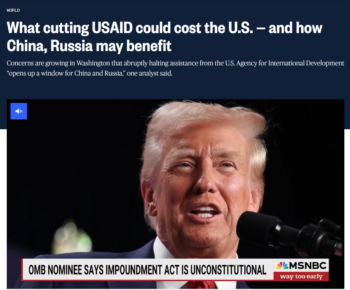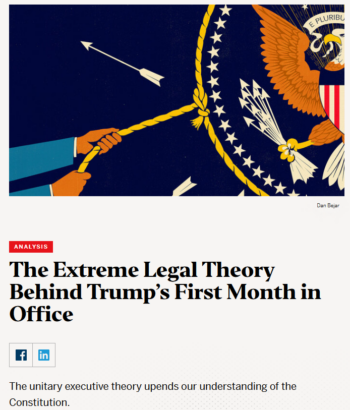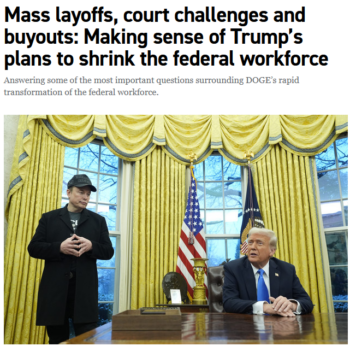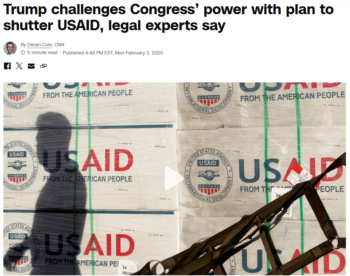
NBC News (2/4/25) put Trump’s unconstitutional attack on USAID in a Cold War frame.
Are the corporate media outlets reporting on Donald Trump and Elon Musk’s authoritarian takeover smarter than a fifth grader? Recent coverage of the president and his henchman’s blatantly unconstitutional dismembering of the US Agency for International Development (USAID) would suggest some are not.
Reports on the agency’s shuttering (Politico, 1/31/25, 2/14/25; NBC, 2/4/25) have often failed to sufficiently sound the alarm on how Trump’s efforts are upending the most basic—and vitally important—federal checks and balances one learns about in a Schoolhouse Rock episode. Instead, these reports have framed bedrock constitutional principles as if they were up for debate, and neglected to mention that the Trump administration is purposefully attempting to shirk executive restraints.
Meanwhile, much of corporate media’s justified attention on the foreign aid agency’s demise has wasted ink on a narrower, unjustifiable reason for audiences to draw objections: the loss of the “soft power” USAID gives America in its battle over global influence with its adversaries (CNN 2/7/25; New York Times 2/11/25). This sets up the precedent that Musk’s federal bludgeoning should be assessed based on the value of his target, rather than the fact that he is subverting the Constitution.
‘The least popular thing’

Michael Waldman (Brennan Center, 2/19/25): “Trump’s power grab…is the culmination of decades of pressure from conservative organizations and lawyers who have sought a way to dismantle government and curb its power to intervene in markets.”
A lawsuit by the American Foreign Service Association and the American Federation of Government Employees against the Trump administration lays out the five-alarm constitutional fire the shuttering of USAID has set off. USAID was established as an independent agency outside the State Department’s control by an act of Congress in 1998.
Longstanding judicial precedent holds that only Congress has the ability to create and dissolve federal agencies. Last year, the legislature prohibited even a reorganization of USAID without its consultation in an appropriations law. The Trump administration’s actions—justified solely by an extreme interpretation of executive authority—violate the Constitution’s separation of powers, and are indeed designed to do so.
Together Trump and Musk share interest in reconstituting US governance. The checks and balances that help to constrain executive power, along with civil service workers, are also roadblocks to the billions in federal contracts that have underwritten Musk’s empire. USAID has become the first target in their federal bludgeoning, because its relative unpopularity among voters means they might get away with rewriting the Constitution without too much public outrage. Its “the least popular thing government spends money on,” Secretary of State Marco Rubio said to a USAID official earlier this month. (Americans tend to vastly overestimate how much the US government spends on foreign aid, and think it should be reduced to a level that is actually far more than USAID’s current budget—Program for Public Consultation, 2/8/25.)
Trump and Musk’s withdrawal of nearly all foreign aid funded through USAID is another grave challenge to the constitutional order. Since those funds were congressionally appropriated, neither Trump nor Musk has the authority to stop them, especially not on the basis of their political preferences.
The act of a president indefinitely rejecting congressionally approved spending is known as impoundment, which has been effectively outlawed in all forms since 1974. Trump has been explicit about his intent to bring impoundment back, which threatens to render Congress—which is supposed to have the power of the purse—irrelevant.
‘Musk has been clear’

Politico (2/14/25) would have better helped readers’ understanding if it hadn’t taken “Trump’s plans to shrink the federal workforce” at face value.
Such a threat to democracy requires calling it for what it is. Simple but consequential abdications of responsibility abound, though. Politico (2/14/25), for example, saw fit to reprint at face value Trump and Musk’s claims that they just wish to drastically reduce federal spending. An explainer article on Trump and Musk’s efforts made no mention that they might have ulterior motives.
In response to the question, “What is Trump and Musk’s goal?” Politico simply answered: “With Trump’s blessing, Musk has been clear that his goal is to drastically reduce the size of the government.” That Musk, the richest person in the world, whose business empire spans the globe and dominates whole industries, has resolved to dedicate his undivided attention to the cause of reducing federal spending deserves more skepticism. The fact that Musk has prioritized going after federal agencies that have had the temerity to investigate his businesses suggests a more plausible scenario.
Though the article, which is meant to give readers a brief but comprehensive overview of Trump and Musk’s efforts, briefly mentions some of the court-ordered pauses to Trump’s orders, it doesn’t discuss the overarching implications for US democracy.
Another Politico story (1/31/25), breaking the news that Trump intended to subsume USAID into the State Department, gave the move a stamp of approval by pointing out it was the fulfillment of long-held bipartisan aspirations—corporate media’s highest praise—while ignoring the unconstitutional means that brought it about. For years, the article says, “both Democratic and Republican administrations have toyed with the idea of making USAID a part of the State Department.” That’s because, Politico claimed,
there have always been tensions between State and USAID over which agency controls what parts of the multibillion-dollar foreign aid apparatus, regardless of which party is in power.
The article qualifies that USAID “describes itself” as an independent agency, as if this were up for dispute.
‘Keep America safe’

CNN (2/3/25): “Trump’s claim that he can single-handedly shut down USAID is at odds with Congress’ distinct role in forming and closing federal agencies.”
Corporate media’s failure to foreground the authoritarian threat of Trump and Musk’s USAID takedown also includes a narrow focus on its geopolitical ramifications that smooths over the unsavory aspects of the agency’s humanitarian work.
USAID oversees billions in foreign aid that is responsible for lifesaving food, medical care, infrastructure and economic development. The massive disruption in that aid is already causing death, hunger, disease outbreak and economic hardship. But a defense of that lifesaving work, and the democratic norms threatened by its unraveling, need not require a rosy picture of its imperialist motivations.
That’s exactly what the New York Times’ Daily podcast (2/11/25) accomplished, though, in an episode titled “The Demise of USAID and American Soft Power.” As has become all too frequent, nowhere during the episode’s 35-minute run time did the host, Times reporter Michael Barbaro, or his two guests, Times journalists Michael Crowley and Stephanie Nolen, mention the constitutional principles at stake in USAID’s closure (though the following episode was dedicated to the constitutional crises Trump has provoked—Daily, 2/12/25).
Instead, the podcast focused on what Barbaro described as Trump’s overturning of a decades-long bipartisan consensus about the best way to “keep America safe.” That safety, Barbaro learned by way of his guests’ contribution, is a supposedly serendipitous return on investment America receives through its strategic generosity abroad (effective altruism, one might say?). Trump has now abandoned that generosity, leaving a more brutish impression of America’s global role, and ceding ground to geopolitical adversaries, Barbaro and company said.
What threats do they identify that Americans have needed to be kept safe from? At first, Crowley said, it was the Soviet Union’s relative popularity in the developing world. After the Cold War ended, though, USAID’s justification for existence seemed thin, he acknowledged. But that didn’t last long, because it just so happened that after 9/11, “America realized that the Soviet Communist ideology that threatened us had been replaced by a new ideology. It was a terrorist ideology,” Crowley explained.
For one, it wasn’t just USAID, but the entire military industrial complex, that was inevitably going to identify a new justification for its existence, 9/11 notwithstanding. But the podcast also completely leaves out USAID’s modern role in conditioning aid to developing countries on opening up their economies to the International Monetary Fund and multinational corporations, creating the conditions for neo-colonial dispossession and Western dependency.
Dedicating a whole episode to portraying USAID’s work as a mutually beneficial marriage between developing nations’ humanitarian needs and US national security interests, all so that audiences might selfishly conclude that preserving foreign aid is in their own interests, perpetuates imperial propaganda. Pointing out how Trump’s actions harm people, including his own supporters, is well and good. But the loss of imperial soft power is not an example of that. And pointing out the actual harms without discussing the autocratic way they were inflicted risks suggesting that unconstitutional actions are acceptable as long as their results are beneficial.
Some journalists are doing a fine job of exposing the assault on USAID (e.g., New York Times, 1/28/25, 2/5/25; CNN, 2/3/25). But amid this unprecedented blitz on democratic norms, others are showing that they might need to revisit their elementary school textbooks.
This content originally appeared on FAIR and was authored by Luca GoldMansour.
Luca GoldMansour | Radio Free (2025-02-21T22:26:05+00:00) Covering Attack on USAID as if Constitutional Restraints Were Up for Debate. Retrieved from https://www.radiofree.org/2025/02/21/covering-attack-on-usaid-as-if-constitutional-restraints-were-up-for-debate/
Please log in to upload a file.
There are no updates yet.
Click the Upload button above to add an update.